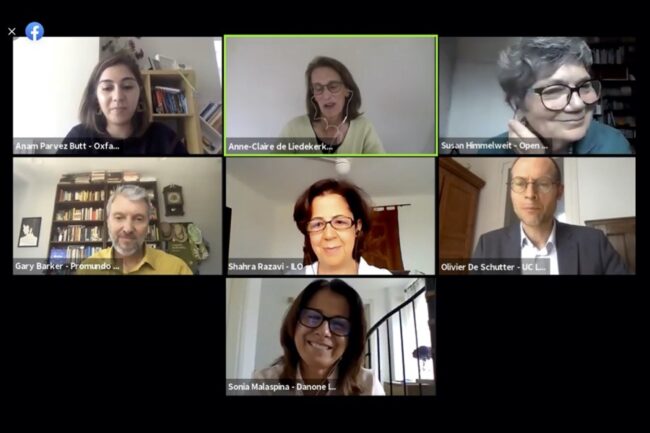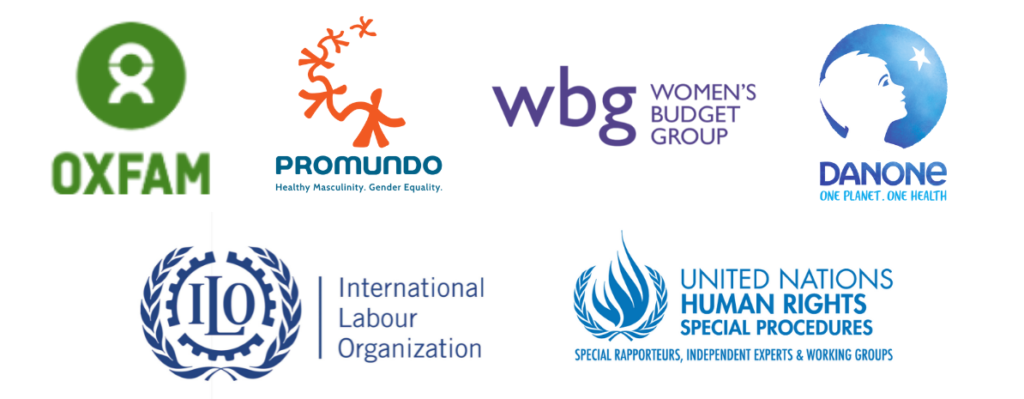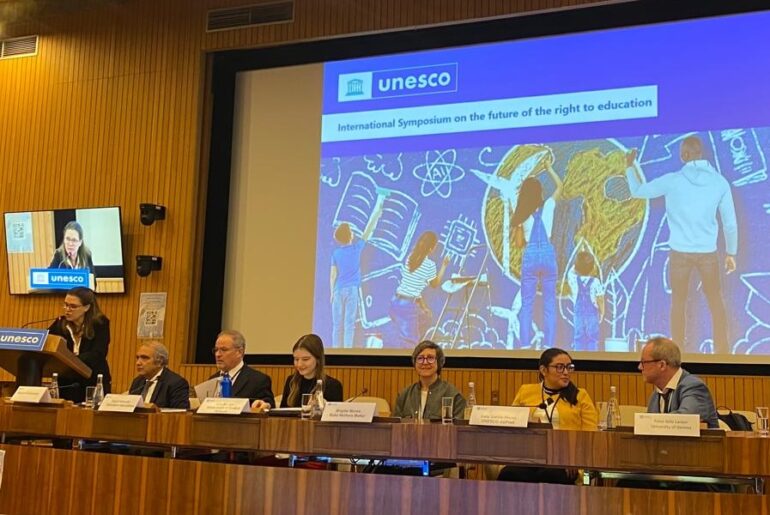Unpaid care work is work that our economic system must recognize, invest in and support
19.07.21
UN New York / HLPF - A look back at our side-event to the UN High Level Political Forum

On 14 July 2021, MMM organized a virtual HLPF side-event on ‘Changing narratives about unpaid care work and the economy‘ to discuss how changing the way unpaid care work is perceived and socially and economically valued is a first and necessary step to bring about systemic changes for more economic justice for women, mothers especially.
Our objectives
- Raise awareness on the multiple benefits of taking a more holistic approach to “work”, i.e. considering both paid and unpaid care work, by recognizing that unpaid care is indispensable work that sustains the economy and develops valuable skills
- Make the case for a paradigm shift in our economic narrative around Care, so that in budgets, spending in care, education, health and family support, are considered as investments – not as expenses to be minimized
- Showcase examples of good policies/practices that can change perspectives and views on unpaid care work and our economy
- Call on governments and international organisations to seize the opportunity to transform our economy and move from the short-term and exploitative “GDP growth” narrative to the ‘wellbeing economy’ narrative
Event report and our key takeaways
MMM 2021 HLPF side-event full report
- Narratives and norms on care exist in the social sphere but also within institutions, influencing policy and investment decisions. Technology and public services alone won’t shift women’s workload. it’s the combination of these investments and the narrative and norms changes, that lead to sustainable changes in women’s live
- The pandemic gives us the opportunity to question what ‘work’ means, and which work matters for society. Whether paid or unpaid, care work is indeed ‘work’, skilled work. It must be counted in labour force statistics, and ultimately in the measure of our economies: giving visibility to the enormous economic importance of unpaid care is critical for recognition
- Redistribution of unpaid care work is key to closing the care gap: care policies must promote men’s equal participation in caregiving, which means challenging gender norms and the narrative that care is a woman’s duty. But men must also be held accountable as politicians and decision makers. Every stakeholder must be involved in Care: in a new ‘caring economy’, we would all be ‘citizen carers’
- Private companies also have a role to play – and they can only gain from caring for caregivers, in particular mothers. Caregiving develops life/soft skills which are also valuable for a company
- We must show the benefits of supporting and investing in care, in particular on wellbeing outcome – and the costs of not doing so, and challenge the perception that care is a ‘burden’ and only constraints women’s lives. Care should be at the heart of our society and our economy and hence at the center of policymaking through a national Care policy – instead of piecemeal fixes to the existing system in the name of gender equality
- Care services and Social Protection are key elements of a national Care policy, to support, redistribute and even reward unpaid care work (e.g. through paid leaves); and they must be considered as an investment, an investment in people’s human capabilities, which provides both economic and social payoffs. They must also be transformative – i.e. acknowledge the work of caring without reinforcing gender stereotypes and discriminations against women
- The design of the pension system, which is part of social protection, also matters a lot. It should have a redistributive effect and reflect the fact that unpaid care is a collective responsibility
- For sustainable positive change, we need to work with unexpected allies beyond the women’s rights sphere, and invest in a narrative shift as a strategy at both community and institutional levels
Event recording
Many thanks to our speakers for their rich and insightful contributions
- Olivier De Schutter, UN Special Rapporteur on extreme poverty and human rights
- Susan Himmelweit, Feminist economist, Emeritus professor of economics for the Open University in the UK, member of the UK Women’s Budget Group Commission for a Gender Equal Economy
- Gary Barker, Founder and CEO, Promundo Global – Powerpoint presentation
- Sonia Malaspina, Director, Human Resources South Europe, Danone Specialized Nutrition – Powerpoint presentation
- Anam Parvez Butt, Gender Justice Research Lead and Policy Advisor, Oxfam Great Britain – Powerpoint presentation
- Shahra Razavi, Director, ILO Social Protection Department

For additional background information see also our invitation article
Resources from our speakers
From the Special Rapporteur on extreme poverty and human rights
- The SR’s call to set up a Global Fund for Social Protection at the 47th session of the Human Rights Council
From the Women’s Budget Group UK
- Women’s Budget Group’s Commission on a Gender Equal Economy final report “Creating a caring Economy: a Call to Action”
- The spiral of inequality video and infographics which shows why the unequal division of unpaid care is at the heart of gender inequality.
- A blog post and a Podcast on the unequal division of unpaid care due to the pandemic in the UK and in a podcast here
From Promundo Global
- 2021 State of the World’s Fathers Report on Structural solutions to achieve equality in care work
- 2021 Report on Paid Leave and the pandemic: effective workplace policies and practices for a time of crisis and beyond
From Danone & its partner Lifeed
- Sonia Malaspina’s TEDx talk on How to implement gender equality in the workplace
- Lifeed – Life feeds education
From Oxfam
- 2020 Report Time to Care
- 2021 Report Public good or private wealth – Universal health, education and other public services reduce the gap between rich and poor, and between women and men. Fairer taxation of the wealthiest can help pay for them
- WEE-Care programs
- Oxfam & Unilevers’s joint Business briefing on unpaid care and domestic work
From the International Labour Organisation (ILO) & UN Women
- ILO 2018 Report Care work and care jobs for the future of work
- ILO’s Social Protection website
- UN Women’s Progress of the world’s women 2015–2016 report Transforming Economies, Realizing Rights
The New EU Gender Equality Roadmap : A Call for Inclusion of Mothers
04.03.25
The European Commission’s initiative on a new Gender Equality Roadmap post-2025, marks a significant step forward in addressing gender disparities across the European Union. Make Mothers Matter (MMM
Breaking the Cycle: Gender Equality as a Path to Better Mental Health
18.03.25
The Council of the European Union has taken a decisive step in recognising the vital connection between gender equality and mental health.
Europe Must Listen to Mothers: Our landmark report heads to the European Parliament
28.08.25
On 22 September 2025, the voices of mothers will take centre stage in Brussels. For the first time, Make Mothers Matter (MMM) will present its State of Motherhood in Europe








